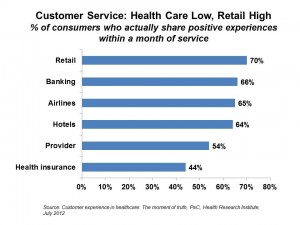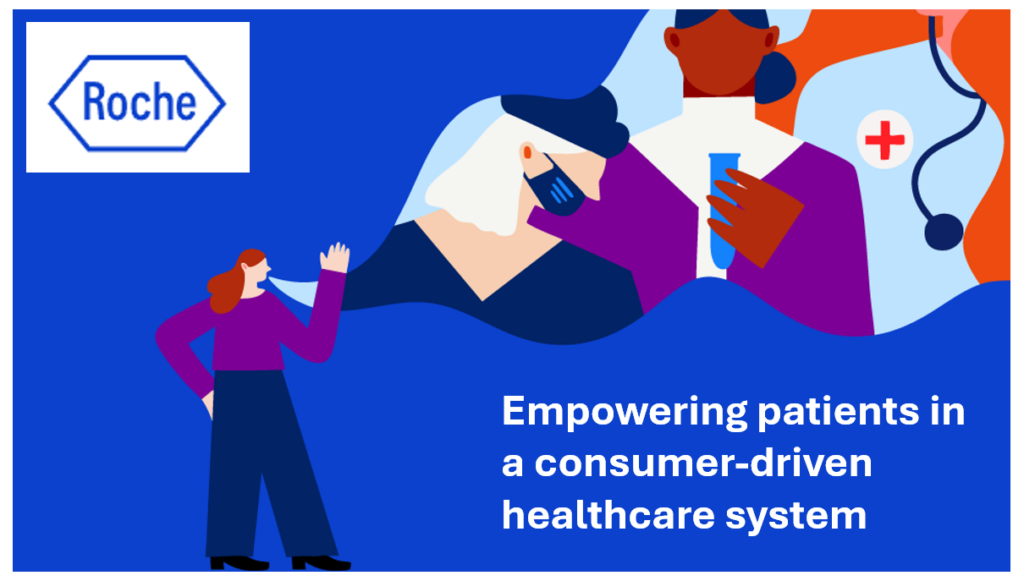When it comes to customer service, retail, banks, airlines and hotels are tops. Health care? Not so good.
This sobering finding comes via PwC’s report, Customer experience in healthcare: The moment of truth. PwC pulled data from the company’s Customer Experience Radar survey of 6,000 consumers across industries. This particular analysis looks at consumers’ service views on banking, hospitality, airline, retail vs. health care providers and insurance companies.
The chart shows consumers’ answers to a question of whether they are willing to report positive interactions about a customer experience. The graph shows that people are more likely to share opinions about positive experiences gained from retail, banking or travel compared to a health provider encounter or call to a health insurance plan. Willingness-to-share opinions is important in health care because it is a proxy for willingness-to-recommend — where word-of-mouth between friends and family in health care is hugely important as a determinant of demand.
PwC points to five important forces that shape the health care consumer service experience today:
- Increased cost sharing
- The push for value by health purchasers and plan sponsors
- Greater desire for “on-demand” health care, such as retail clinics
- Information access
- Health reform, bringing in millions of newly-insured health consumers.
Together, these factors drive consumers to be more demanding of convenience, access, quality, and service. In particular, price and product transparency and self-service are two areas lacking in the consumer experience of health care in America.
An intriguing point in the study is that for the non-health industries, price is an important purchase driver. However, the most important purchase driver for health consumers, PwC says, is personal experience. And, in personal experience, peer networks are very influential.
Health Populi’s Hot Points: I spent an early part of my career as a consultant in the firm Laventhol & Horwath, which focused on 3 industry segments: health care, hospitality, and real estate. While I worked in the health care group, it was a handful of hospitality partners who taught this young consultant some seminal lessons for health care related to customer service. I brought into the idea of the “moment of truth” in service, the 360-degree experience throughout which consumers can come to love — or despise — you. After that, I read the book Lovemarks: the future beyond brands from Saatchi & Saatchi, and further honed my own worldview for customer service in health care.
Now PwC shows us that health care is still dismally under-performing when it comes to customer service. And as health care goes more retail-facing — that is, consumer-facing — people need to find the love.
PwC’s survey found that consumers value convenience of many services in one location, online and mobile information exchange, patient education during the visit, and entertainment/cafeteria from providers. From health plans, consumers value an inclusive network of providers, claims processing in less than 2 weeks, insurer information on paper and other formats, and website content with provider and plan information.
These kinds of wants translate into a health care environment that’s more convenient and more informative — call this, “empowering” and “engaging.” To get here, providers and plans can first treat patients like retail consumers, making this a modus operandi for the organization pleasing people the way a Nordstrom or an Amazon seeks to do as a core corporate value.
There are many strategies that can be right for health care customer service in health organizations: starting with a service orientation first will help set the provider or plan on the consumer-driven course. The tactics under that involve transparency, willingness to help people navigate the complex journey of health care, opening up communication forums for consumer feedback, and “going beyond the transaction,” as PwC puts it. That’s the extra mile an employee or administrator goes to make certain a health consumer has a delightful experience. Health care has a lot to learn from retail and hospitality.





 I was invited to be a Judge for the upcoming
I was invited to be a Judge for the upcoming  Thank you Team Roche for inviting me to brainstorm patients as health citizens, consumers, payers, and voters
Thank you Team Roche for inviting me to brainstorm patients as health citizens, consumers, payers, and voters  For the past 15 years,
For the past 15 years,